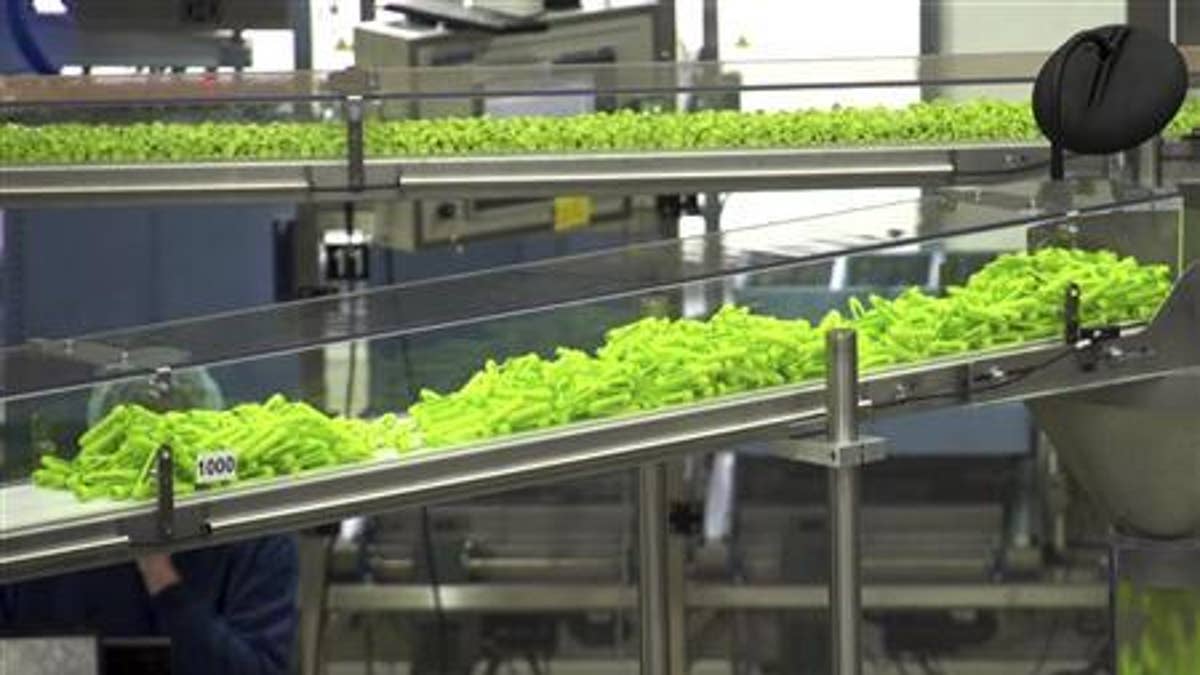
The new long-acting insulin Tresiba drug is seen on a Novo Nordisk production line, in this 2012 handout picture provided by Novo Nordisk. U.S. regulators dealt a major blow to Novo Nordisk's hopes for its new long-acting insulin Tresiba by demanding the Danish drugmaker conduct additional clinical tests to assess potential heart risks. (REUTERS/Novo Nordisk/Handout)
U.S. regulators refused to approve Novo Nordisk's new long-acting insulin Tresiba until it conducts extra tests for potential heart risks, dealing a major blow to a key product for the Danish drugmaker.
Shares in Novo, the world's leading insulin maker and the most valuable company in the Nordic region, slumped 12.5 percent as it said the decision would make it harder to meet long-term financial targets. Rival insulin producer Sanofi rose 4.5 percent.
At one stage, Novo shares were down as much as 17 percent on Monday, their biggest daily decline since 2002.
As the world suffers from an epidemic of type 2 diabetes tied to over-eating and lack of exercise, demand for treatments has snowballed. Novo has benefited more than any other company because it is so focused on diabetes, lifting its shares to a lofty premium over other European drugmakers.
Novo said the U.S. Food and Drug Administration (FDA) had requested additional data from a trial focused on cardiovascular effects before it would consider approving Tresiba and related product Ryzodeg.
The drugmaker, which is banking on Tresiba to keep it in the lead in diabetes care, said late on Sunday it could not provide the data in 2013 and Chief Scientific Officer Mads Thomsen later told Reuters it would not be ready in 2014 either.
"It is a really bad situation," said Sydbank analyst Soren Hansen, who expects a delay of two or three years.
Tim Anderson of Bernstein said the best that Novo could now hope for was that Tresiba made it to market in 2015, assuming the new trial enrolls patients quickly and the FDA requires only partial data and not full completion.
Waiting for all the data could delay approval to 2017 or 2018, he said, and if the study reveals new risks it may never be approved.
Thomsen said he hoped to start talks with the FDA this week to find out exactly what data it required and how long a new study might take.
The setback for Tresiba, also known as degludec, is good news for rival makers of insulin medicines, notably France's Sanofi, whose Lantus product is threatened by Novo's newer ultra-long-lasting treatment.
Most investors had expected a green light from the U.S. watchdog, following a positive recommendation from an advisory panel to the FDA last November, despite earlier signals that there might be heart issues with the medicine.
Optimism about Tresiba and Ryzodeg - which combines degludec with another formulation of insulin - was further boosted by approval in Europe, where both drugs won a final go-ahead last month. They have also been approved in Japan.
Confounds expectations
Analysts had been expecting Tresiba and Ryzodeg to sell some $2.8 billion annually by 2017, according to consensus forecasts compiled by Thomson Reuters Pharma. Those numbers look set to fall sharply, since the lucrative U.S. market was seen making up more than half of the total.
Novo Chief Executive Lars Sorensen said the U.S. setback would have no impact on the group's plans for the roll-out or pricing of the drugs in Europe and Japan.
The FDA's decision to issue Novo with a so-called "complete response letter" confounded expectations. Such letters are issued when the U.S. agency determines that an application cannot be approved in its existing form.
"We are surprised and disappointed to receive this letter, but we acknowledge this decision by the FDA and will work with the agency to determine the best path forward to completing the review," Sorensen said.
Novo received the letter on February 8 but only made it public on Sunday.
In fact, concerns about the cardiovascular safety of Tresiba are not a complete surprise, although Novo and most analysts had thought the issue had been resolved.
The FDA advisers' meeting last year expressed concern about a trend toward higher incidence of adverse heart events with the new insulin than with older ones. However, the differences seen in 16 large clinical trials were not statistically significant.
In addition to calling for new trials on Tresiba's heart safety, the FDA said approval for Tresiba and Ryzodeg could not be granted until violations cited in a December 12 warning letter had been resolved.
The FDA is very cautious about the safety profile of new diabetes treatments, following controversy over GlaxoSmithKline's Avandia pill, which was linked to serious heart problems after being on the market for years.
Novo said the FDA's decision not to grant approval at the present time was not expected to impact its financial forecasts significantly for the current year.
The big concern of investors, though, is that a lengthy delay in getting Tresiba launched in the world's biggest drugs market will seriously undermine Novo's ability to stay ahead of rivals such as Sanofi and Eli Lilly.
Mark Clark of Deutsche Bank said the setback would be seen as "unequivocally good news" for Sanofi's long-acting insulin Lantus, which is the French company's biggest-selling product, with sales this year expected to reach some $6.6 billion, 62 percent of which will come from the United States.








































